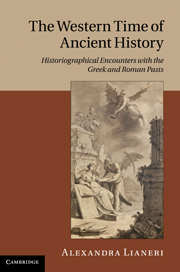Book contents
- Frontmatter
- Contents
- Acknowledgements
- Notes on contributors
- INTRODUCTION
- THEORISING WESTERN TIME: CONCEPTS AND MODELS
- ANCIENT HISTORY AND MODERN TEMPORALITIES
- UNFOUNDING TIME IN AND THROUGH ANCIENT HISTORICAL THOUGHT
- 10 Thucydides and social change: Between akribeia and universality
- 11 Historia magistra vitae in Herodotus and Thucydides? The exemplary use of the past and ancient and modern temporalities
- 12 Repetition and exemplarity in historical thought: Ancient Rome and the ghosts of modernity
- 13 Time and authority in the Chronicle of Sulpicius Severus
- AFTERWORD
- Bibliography
- Index
13 - Time and authority in the Chronicle of Sulpicius Severus
from UNFOUNDING TIME IN AND THROUGH ANCIENT HISTORICAL THOUGHT
Published online by Cambridge University Press: 03 May 2011
- Frontmatter
- Contents
- Acknowledgements
- Notes on contributors
- INTRODUCTION
- THEORISING WESTERN TIME: CONCEPTS AND MODELS
- ANCIENT HISTORY AND MODERN TEMPORALITIES
- UNFOUNDING TIME IN AND THROUGH ANCIENT HISTORICAL THOUGHT
- 10 Thucydides and social change: Between akribeia and universality
- 11 Historia magistra vitae in Herodotus and Thucydides? The exemplary use of the past and ancient and modern temporalities
- 12 Repetition and exemplarity in historical thought: Ancient Rome and the ghosts of modernity
- 13 Time and authority in the Chronicle of Sulpicius Severus
- AFTERWORD
- Bibliography
- Index
Summary
‘Christianity,’ wrote a young Alasdair MacIntyre, ‘cannot dispense with the notion of men having parts in a cosmic drama.’ This was a drama that played out on the level of history – for it was a defining feature of Christianity that the claims it made were not only transcendental but also, importantly, historical. It mattered for Christianity that Christ had been born at a specific historical moment, just as it mattered for Judaism – and ultimately for Christianity too – that the Jewish patriarchs had historically encountered and made covenants with their God. The structure of the Christian Bible itself makes this aspect plain: by taking over much of the Jewish tradition, the Christians were able to begin their authoritative account of the world with its creation, and to follow a privileged strand of history through the successes and travails of the Jews, so that even the books of the laws and the prophets, and of proverbs and psalms, were placed in a thoroughly historical context. The New Testament was bound equally tightly into this tradition, not only by an explicit grounding in a particular historical moment – as when Luke relates the birth of Christ to the reigns of Augustus and Herod – but also in the efforts of the New Testament writers to identify Jesus of Nazareth as the anticipated subject of Jewish messianic prophecies, not least by making him a descendant of the House of David.
- Type
- Chapter
- Information
- The Western Time of Ancient HistoryHistoriographical Encounters with the Greek and Roman Pasts, pp. 280 - 298Publisher: Cambridge University PressPrint publication year: 2011



